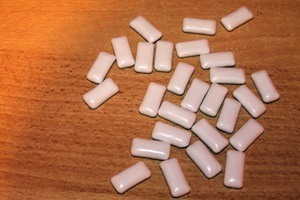 Anyone ever informed you that you’re not as daft as you think you are?
Anyone ever informed you that you’re not as daft as you think you are?
And then does that little voice in your head ask, “How do you know how daft I think I am?”
We all feel silly from time to time. We’ve all done foolish things, and questioned our brainpower or indeed, sanity!
One of the most bonkers things I think I’ve done was many years ago, anticipating a dip in the spa waters in Rosh Pinna, north of the Sea of Galilee, in Israel. Knowing that the water was, apparently good for you but bad for cheap jewellery, I removed the silver earrings from my ears, understanding that the water would react with the metal.
 And then I did something incomprehensibly stupid!
And then I did something incomprehensibly stupid!
I stuffed them down the top of my bikini, and proceeded to enter the water!
Thus dunking said silver earrings in the water anyway!
Duh!
And yes, the water reacted with the silver and turned the earrings black!
Sometimes I think I am indeed as daft as I think I am!
On the other hand, it did inspire my lovely husband to buy me a decent pair of diamond earrings, which I have enjoyed wearing everywhere and anywhere, ever since.
So maybe, not so daft after all!
Perhaps, like me, you have been surprised both by your apparent stupidity one minute, and genius thinking the next?
Or is it just me?
 There’s so much we still don’t understand about the brain. Imagine that – most of what we know about the brain we have learnt in the last few years, and there are so many unanswered questions, we still can’t get our head around it! Ha ha!
There’s so much we still don’t understand about the brain. Imagine that – most of what we know about the brain we have learnt in the last few years, and there are so many unanswered questions, we still can’t get our head around it! Ha ha!
Certainly, what I was taught at school about the brain is complete and utter tosh, and yet it was the best information we had at the time.
OK, I admit it. That was a while ago now.
Crikey! A long while ago!
Encouragingly though, the more we learn about the mysterious workings of the brain, the more tips and tricks we discover we can use to improve our brain-power.
Wanna try these? Each will only take you a few seconds. Give ‘em a go and let me know how you get on.
4 ways to improve your brain-power
 Go Green
Go Green
We already know that hospital patients whose beds allow them to see nature and the environment through the window recover faster. What’s more, it turns out it doesn’t even have to be the real thing. Recovery is faster for those patients able to see a large photograph or mural of the natural world painted on an adjacent wall.
But a new study at the University of Milbourne has recently discovered that looking at images of nature for less than a minute was all it took to improve participants’ attention spans and concentration, reducing mental errors when tested.
So if you want to concentrate on a task, look out your window, if you’re lucky enough to look out onto a green scene, and if not, maybe consider installing screensaver on your computer that will do the job just as well.
 Chew gum
Chew gum
Remember, in a recent blog I mentioned that if you’ve got a really annoying song going round and round in your head, chewing gum will help you get rid of it.
In fact, just up the road here, at the University of Reading, research confirmed that, and I quote, “…co-opting the articulatory motor programme to chew the gum impairs the involuntary recollection of an auditory image.”
So now you know!
 Eat chocolate
Eat chocolate
Dark chocolate, that is.
Professor Larry Stevens, at the University of Northern Arizona, tells us that eating it in the afternoon, when you’re beginning to feel a bit drowsy from a heavy lunch (you know, that period of the day that presenters and lecturers call, ‘the graveyard shift’) can help you concentrate by increasing your attention.
Who’d have thought that scientists have so much fun conducting their research!
Look out though, because dark chocolate increases your blood pressure. I don’t know if that’s by a lot or by a little, and whether you need to be worried about it but I thought I’d better mention it, just in case.
Tree climbing
Now, you’re not going to believe this!
Any activity where you’re engaged in tough physical endeavour, involving strength and effort (or in other words proprioception) such as tight rope walking, running around avoiding obstacles, carrying awkward and heavy objects, swinging on a rope and, of course, climbing trees, improves your working memory by as much as 50%. So says Dr Tracy Alloway at North Florida University.
And by the way, she believes that working memory is a better measure of intelligence than the traditional IQ tests.
I used to believe that good teachers were the ones in whose class the children weren’t swinging from the light fittings!
How wrong can ya be!


